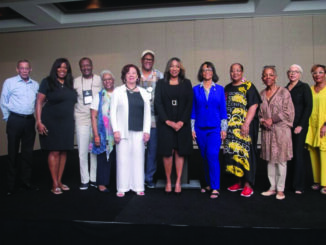

Former N.C. Governor stands up for justice
By Maya Rhodan
WASHINGTON, D.C. (NNPA) – They were Southern governors who shared the same last name – Perdue – but took different approaches in two high-profile race-sensitive cases. Despite a direct appeal from Pope Benedict XVI, Georgia Gov. Sonny Perdue did not spare Troy Davis from execution in 2011 for allegedly killing a Savannah policeman.
Over the objections of many, including some members of her own staff, last December North Carolina Gov. Beverly Perdue issued pardons of innocence to the Wilmington Ten, activists who were imprisoned for crimes they did not commit.
Five days before she left office and 40 years after the Wilmington Ten was convicted Perdue, the first female governor of North Carolina granted full pardons of innocence to the group. Pardons of innocence are granted to show that the state of North Carolina no longer believes the Wilmington Ten committed a crime.
Perdue was honored by the National Newspaper Publishers Association Foundation last week for her display of courage. The awards ceremony capped a 2-year campaign by the NNPA to win pardons for the Wilmington Ten.
In issuing the pardons, the North Carolina governor cited “naked racism” for the false conviction of the Wilmington 10, led by Benjamin Chavis.
Mary Alice Thatch, publisher of the Wilmington Journal, persuaded the NNPA to take on the challenge of seeking pardons for the 10 activists.
“I don’t know if you remember Michelle Obama saying, ‘For once in my life, I’m proud of my country,’ Thatch said as the governor was about to be presented with the award. “I want to say to Gov. Perdue, for once in my life, I am proud of North Carolina. Thank you so much.”
The NNPA’s Wilmington Ten Pardon of Innocence Project was an effort to “generate national and worldwide support for the petition, to the state of North Carolina, and specifically the governor, to grant individual pardons of innocence to the Wilmington Ten.”
Publishers across the country prominently displayed stories on the case. Cash Michaels, editor of the Wilmington Journal, wrote a series of stories most of 2012 that shed light on the questionable actions of the prosecutor, who made notes during jury selection showing a preference for “KKK”-type supporters.
On Feb. 6, 1971, a White-owned grocery store in a predominantly Black neighborhood was firebombed during a demonstration in Wilmington, N.C. When emergency responders got to the scene, they were shot at by snipers.
Nine Black men and one white woman were arrested and later charged with conspiracy to commit arson and conspiracy to assault emergency response teams. They became known as the Wilmington Ten.
After three of the prosecution’s witnesses recanted their testimony, Amnesty International and other groups rallied on behalf of the Ten, citing the actions of the prosecutor as unjust and corrupt, portraying the imprisoned group as political prisoners.
In 1980 all of their convictions were overturned, but the governor of North Carolina withheld a pardon. Nearly 40 years later, the pardons were granted.
The efforts of the Black Press were recognized by Chavis, one of the seven surviving members of the Wilmington Ten. Speaking on behalf of the activists and their families, Chavis said. “This is another proud moment. We salute Gov. Beverly Perdue for her courage, for her leadership, and for making a difference.”
Chavis was sent to Wilmington in 1971 by the United Church of Christ’s Commission for Racial Justice to organize and lead a group of students amid tensions caused by the closing of a Black high school.
Their headquarters were at Gregory Congregational Church, just blocks away from Mike’s Grocery, the White-owned grocery store firebombed in February 1971. Officials claimed to have found ammunition in the church, leading to the arrest and later conviction of Chavis and eight others.
Chavis was sentenced to 34 years in prison.
Although their convictions were overturned in 1980, the Wilmington Ten wasn’t pardoned until Dec. 31, 2012, on the eve of the 150th anniversary of the day the Emancipation Proclamation was signed.
“Without those quiet voices that banded together to speak up for justice in the face of naked racism this wouldn’t have happened,” said former North Carolina Gov. Beverly Perdue after she was presented with the award.
“We in the south understand freedom and equity and privilege,” Perdue said. “It was my privilege to present this pardon of innocence to a group of citizens of my state in this country who were truly innocent. We all would want that for ourselves and our friends and our family and so it was the right thing to do.”
Chavis notes that this event should be a source of pride for the Black Press community.
“The truth is that the context in which the governor made the decision was the context of the Black Press of America through the NNPA flexing its muscles,” Chavis said. “We should never understate what we do, today was a proper statement of what we do.”





Be the first to comment